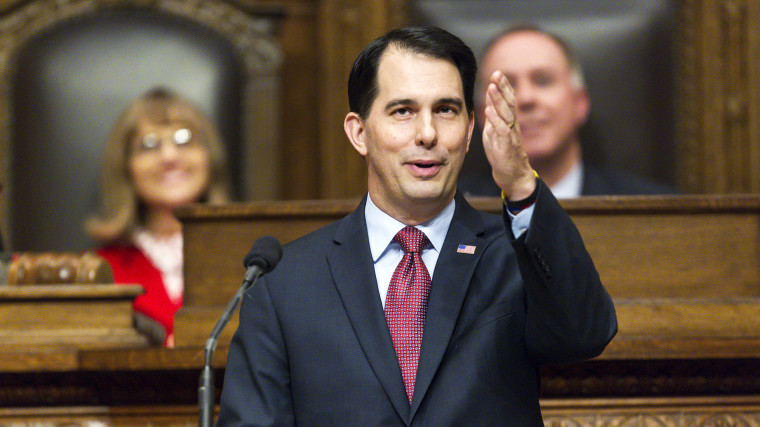As a candidate seeking re-election last fall, Wisconsin Gov. Scott Walker (R) was quite clear: he wouldn't push a so-called "right to work" measure. The Republican governor didn't say he'd veto such a measure, but Walker nevertheless
vowed he wouldn't be "supporting it in this session."
As recently as October, the governor specifically said, "We're not going to do anything with right-to-work."
Overhauling more than a half century of labor law in Wisconsin, Gov. Scott Walker on Monday signed so-called right-to-work legislation banning labor contracts that require private sector workers to pay labor fees. In a matter of weeks, Republicans pushed through the measure making Wisconsin the 25th state with such a law, giving a victory to manufacturers in the state and a blow to organized labor and some construction firms, which had opposed the measure.
Note, during Walker's first year in office, after assuring voters he wouldn't pursue a union-busting campaign in office, the governor sparked a costly and divisive fight, undermining the collective bargaining rights of many public-sector workers.
This new policy, signed into law today, goes even further, undermining private-sector workers.
Let's be very clear about this: [Right to Work] does not confer some new right or privilege on those in states that adopt it. It takes away an existing right: the ability of unions to require the beneficiaries of union contracts to pay for their negotiation and enforcement. In anything, the law creates a right to freeload -- to reap the significant benefits of union bargaining without paying for them. Let's also be clear about what goes on in non-RTW states, as anti-union forces consistently distort the current reality. In non-RTW states, no one has to join a union. There have been no "closed shops" in America for more than 20 years. When RTW advocates say they're fighting against "forced unionism," they are making stuff up. There's no such thing.
Boasting at today's bill signing about the legislation he promised not to sign, Walker said the new policy would boost Wisconsin's economy and make the state more competitive. It we put aside the governor's awful track record -- the governor has been wrong repeatedly about which policies would improve the state economy -- is there any evidence that RTW actually helps?
Actually, no. When Brad Plumber dug into the available scholarship on the issue,
he found, "There's a dizzying amount of research on the subject, but a few broad conclusions have emerged over the years: Right-to-work laws do weaken labor unions. The laws appear to tilt the balance of power so that workers reap fewer of the gains from growth. And it's still hard to find definitive evidence that right-to-work laws help (or harm) a state's overall economy."
So what's the point? For Walker, the point may very well be about 2016 posturing: the likely presidential candidate wants to position himself as one of the nation's fiercest opponent of labor unions -- which he believes demonstrates
an ability to confront ISIS.
It's an odd argument, to be sure, though the same can apparently be said of the Wisconsin Republican's nascent platform.
